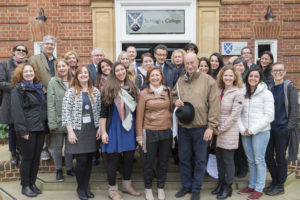 International research experts working to implement a more ethical and inclusive model in research institutions have been meeting in Oxford this week.
International research experts working to implement a more ethical and inclusive model in research institutions have been meeting in Oxford this week.
The Starbios2 (Structural Transformation to Attain Responsible Biosciences) project is part of Horizon 2020, the European Union’s Research and Innovation programme. It aims to promote the notion of Responsible Research and Innovation (RRI), which is made up of five key themes: Public Engagement, Gender Equality, Science Education, Open Access and Ethics.
This, the project hopes, will “reinforce openness in science to create better acceptance of research and innovation, better respond to societal needs, to attract future scientists”.
Project Coordinator Professor Vittorio Colizzi said: “Research and innovation should not be carried out in isolation from the social, political and economic context; it must be connected to society, reflecting its needs and values. This is why things like education, public engagement and gender equality are so important in our research.”
He added that that ‘structural change’ was one of the main objectives of Starbios2: “We would like RRI to become a central and rooted element in the life of these research organisations.”
Collaboration
One of the organisers of the event, Dr Pavel Ovseiko, Senior Research Fellow in Health Policy and Management at the University of Oxford, said: “The idea behind the project is to bring together partners from different countries to facilitate learning among institutions with a view to identifying best practice and learning from each other, and we hope this will create opportunities for collaboration in the long run.
“With many aspects of RRI, such as open access, Oxford is ahead in this field so other countries, where they are just beginning to think about open access, can learn from us. But we can also learn from them. For example, in some countries, education and societal engagement is done much better than here.”
Participants in the meeting, at St Hugh’s College, travelled from EU member states Bulgaria, Denmark, France, Germany, Italy, Malta, Poland, Slovenia, as well as from Brazil and South Africa.
Professor Alastair Buchan, Head of Brexit Strategy for the University of Oxford, Dr Laurel Edmunds, Dr Pavel Ovseiko and Dr Maria Milano, from the Medical Sciences Division, are leading the project in the UK, where much of the Stabios2 attention is focused on the NIHR Oxford BRC.
Dr Vasiliki Kiparoglou, Head of Operations for Oxford BRC and a member of the University of Oxford Athena SWAN Steering Committee, said: “We’re really excited to welcome our European and international partners to Oxford and to be part of efforts to strengthen bioscience research. I am particularly interested in what we can do to encourage more women into science.
“Since 2008, we have had the Athena SWAN Charter for improving gender equality in sciences in the UK, and the Oxford BRC holds 14 Silver Athena SWAN awards, so there is a real momentum here and it’s exciting to see that this is something that other international partners are eager to embrace, even if we could still be doing better in this country.”
Structural change
Dr Lorna Henderson, clinical research manager who is working closely with the Oxford team, said: “We look forward to working with our collaborators to develop shared learning across research institutions on important matters such as gender equity.
“This is a timely and important opportunity to strengthen our understanding and influence structural change as a leading Biomedical Research Centre”.
The discussions are of particular significance, given the UK’s decision to leave the EU.
“While the outcomes of this project are important, so is the process of establishing collaborations,” Dr Ovseiko said.
“We’re hoping these collaborations we have within the project will expand after Brexit and mitigate against the risks of not having access to European funding, but also access to people and infrastructure.”
Alasdair MacDonald, Head of the university’s Brexit Office, added: “The European framework programmes have been vital to research at Oxford, and have helped establish the university as one of the very best in the world.
“But, as important as the research income we have received has been the ability to forge international partnerships and collaborations and recruit the very best European and international academics, researchers, and students.”